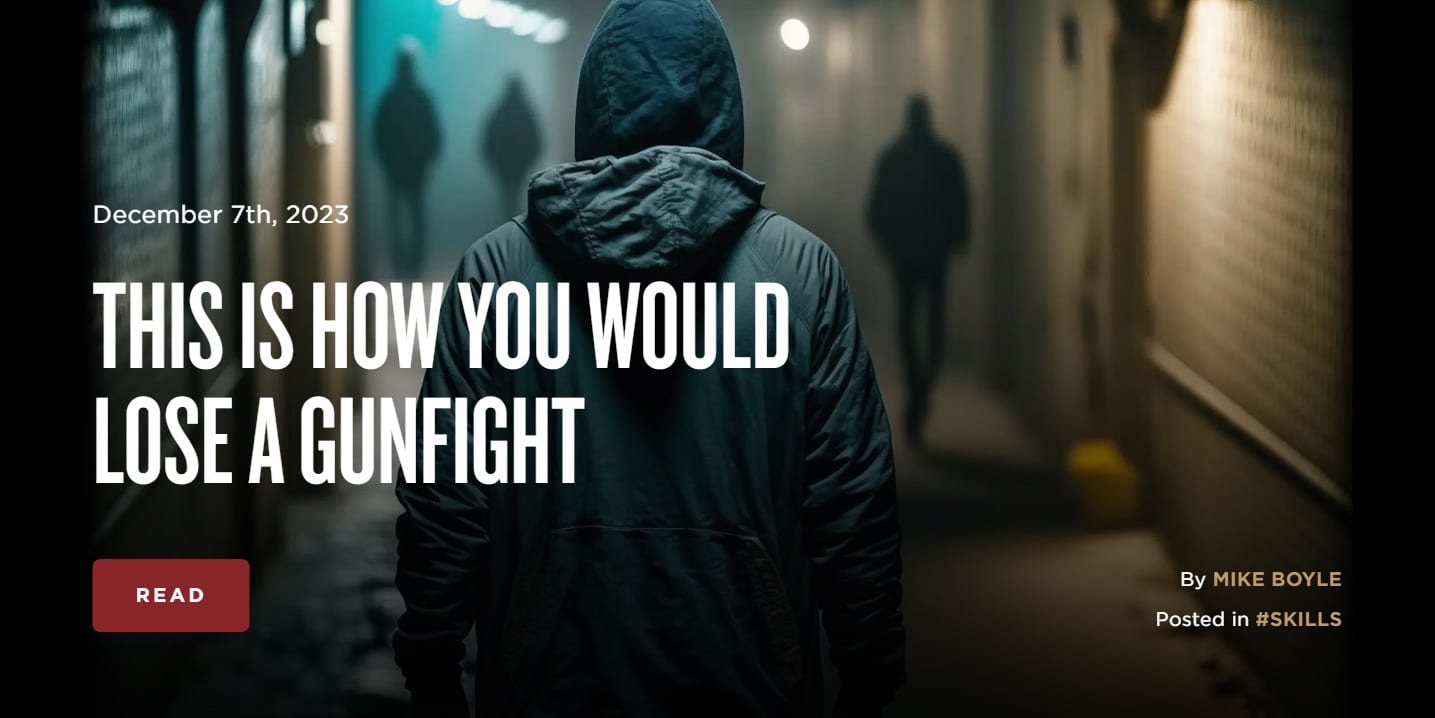Hello all, here is today's article posted on TheArmoryLife.com. It is titled “This Is How You Would Lose a Gunfight” and can be found at https://www.thearmorylife.com/this-is-how-you-would-lose-a-gunfight/.



Si vis pacem para bellumPray for peace but prepare for war.
In my training with Karl Rehn and his instructors, it was stressed that sometimes the best thing you can do is (if not faced with an immediate threat to your person), nothing. As a civilian handgun carrier it isn't you job to catch bad guys or intervene in situations not involving you, but to protect yourself and your family. Sounds like it would have helped the man whose story you describe.Thanks for the link, Mike.
A few days ago, a man was leaving a church service in Memphis, not far from us. As he walked towards his car in the parking lot, he saw several people breaking into cars parked there. I guess he was situationally aware, but when he yelled at the, the guy in the getaway car shot him. I think the other perps started shooting at him too. He wound up at the hospital with two gunshot wounds but survived. This on one of the busiest streets in town.
Care to elaborate?Bull ****
I've said this before but I have a really hard time with this topic because I don't believe that you can learn how to practice situational awareness in a classroom or from reading an article.
I believe the most effective way to learn how to practice situational awareness is to be in a place where you're required to practice situational awareness to "survive".
In the book Band of Brothers Steven Ambrose talks about how the veterans of Easy company didn't even bother to get to know their Replacement's names until they've been with the company at least two weeks. Because if a replacement survived two weeks they had a better chance of surviving longer.
They all had the same infantry training. They all knew they were going to a combat zone. They all knew they needed to be on high alert but the recruits didn't have the experience to recognize danger as quickly as the veterans did.
When I was working as a security guard downtown I got "interviewed" frequently. I'm not saying that that makes me Joe bad*** but I've seen it enough times that I know what I'm seeing when I see it.
I know what it looks like when that crackhead has decided that he's going to put the bum on me instead of the guy at the next gas pump. And when you're the one that's targeted the only difference between being targeted for a panhandler or a mugging is the level of intensity there's still targeting you and if you know what you're looking for you can see it coming.
So that's my opinion. I believe that the concepts of situational awareness can be taught in a classroom but to practice of situational awareness can only be learned by experience.
I also don't believe that there are different levels of situational awareness. You either know what's going on around you or you don't.
Hello all, here is today's article posted on TheArmoryLife.com. It is titled “This Is How You Would Lose a Gunfight” and can be found at https://www.thearmorylife.com/this-is-how-you-would-lose-a-gunfight/.

I also don't believe that there are different levels of situational awareness. You either know what's going on around you or you don't.
Facts on facts.I've said this before but I have a really hard time with this topic because I don't believe that you can learn how to practice situational awareness in a classroom or from reading an article.
I believe the most effective way to learn how to practice situational awareness is to be in a place where you're required to practice situational awareness to "survive".
In the book Band of Brothers Steven Ambrose talks about how the veterans of Easy company didn't even bother to get to know their Replacement's names until they've been with the company at least two weeks. Because if a replacement survived two weeks they had a better chance of surviving longer.
They all had the same infantry training. They all knew they were going to a combat zone. They all knew they needed to be on high alert but the recruits didn't have the experience to recognize danger as quickly as the veterans did.
When I was working as a security guard downtown I got "interviewed" frequently. I'm not saying that that makes me Joe bad*** but I've seen it enough times that I know what I'm seeing when I see it.
I know what it looks like when that crackhead has decided that he's going to put the bum on me instead of the guy at the next gas pump. And when you're the one that's targeted the only difference between being targeted for a panhandler or a mugging is the level of intensity there's still targeting you and if you know what you're looking for you can see it coming.
So that's my opinion. I believe that the concepts of situational awareness can be taught in a classroom but to practice of situational awareness can only be learned by experience.
I also don't believe that there are different levels of situational awareness. You either know what's going on around you or you don't.
I think the meant OC.Facts on facts.
This line gave me pause, “Do you run away, move your dominant hand to your holstered pistol, or discreetly access a less-lethal weapon?”
Less-lethal? This brought up a couple of thoughts:
1) There are schools of thought that says carry my knife on my non-dominant side. This means that I have to train to use my left hand to handle a knife.
2) Less-lethal, is a stab wound to the jugular or femoral artery any less lethal?
A knife is VERY MUCH lethal force.I think the meant OC.
If you pull out of life that's lethal Force
